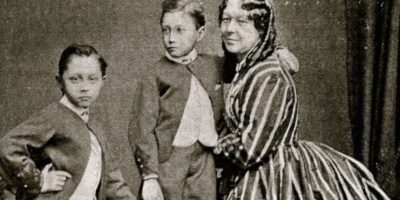
Mrs. Spurgeon
When Susannah Thompson first heard Charles Spurgeon preach, she wasn’t that impressed. But eventually he won her over. On this episode of 5 Minutes in Church History, Dr. Stephen Nichols introduces us to Mrs. Spurgeon.
 “Two pilgrims treading this highway of life together, hand in hand—heart linked to heart,” so said Susannah Spurgeon of her marriage to Charles Haddon Spurgeon. We often hear of Charles Haddon Spurgeon, London’s great nineteenth-century preacher, but let’s spend some time with the other of these two pilgrims: Mrs. Spurgeon. Charles and Susannah were married on January 8, 1856 at the New Park Street Chapel in London, which was a very storied and famous church in Baptist history. It was here that Spurgeon began his preaching and where he began his first permanent role in a church. He was preaching before he got there, and it was after New Park Street Chapel that the Metropolitan Tabernacle was built for him. But they were married at the New Park Street Chapel in 1856, and the crowd was so full that it spilled out of the church and into the streets, and eventually, they just had to turn away a few thousand people.
“Two pilgrims treading this highway of life together, hand in hand—heart linked to heart,” so said Susannah Spurgeon of her marriage to Charles Haddon Spurgeon. We often hear of Charles Haddon Spurgeon, London’s great nineteenth-century preacher, but let’s spend some time with the other of these two pilgrims: Mrs. Spurgeon. Charles and Susannah were married on January 8, 1856 at the New Park Street Chapel in London, which was a very storied and famous church in Baptist history. It was here that Spurgeon began his preaching and where he began his first permanent role in a church. He was preaching before he got there, and it was after New Park Street Chapel that the Metropolitan Tabernacle was built for him. But they were married at the New Park Street Chapel in 1856, and the crowd was so full that it spilled out of the church and into the streets, and eventually, they just had to turn away a few thousand people.
This was London’s most famous couple in the 1850s, such was their fame. They would go on to have twin boys, both of whom would become pastors. Mr. and Mrs. Spurgeon were married for thirty-six years. Charles died in 1892, and about a decade or so later, Susannah died in 1903.
She was born Susannah Thompson on January 15, 1832. The Thompson’s lived in the southern suburbs of the city of London. Susannah first heard her future husband preach when he was only nineteen years old, when she was twenty-one. She told some of her friends that she wasn’t very impressed by his preaching, but of course, she was eventually won over not just by his preaching, but by him, and they had their life together.
Two things we can say about Susannah Spurgeon. One of her lasting legacies is the Book Fund. When Spurgeon published his book, Lectures to My Students, she thought this was a wonderful book that should be in the hands of ministers everywhere. But she also knew that many of them, especially those out in the villages, just couldn’t afford books. She mentioned something to her husband about how sad it was that poor ministers who may desperately need a book like this might not be able to afford it. And so Charles responded with something to the effect of, “Well, why don’t you do something about it?” And so she did. She began to raise money, formed a little committee, and started shipping out books. In the first year, the Book Fund shipped out 3,058 books. By the time of her death in 1903, the Book Fund had distributed 199,315 books to ministers all over the United Kingdom and even in other places on the globe. In her will, Susannah left a nice portion of her estate to continue the Book Fund. So even after her death, her vision to put good books in the hands of needy ministers continued.
The other thing we can say about Susannah Spurgeon is that throughout much of her adult life she was in significant pain, and she suffered severely. For many years she may even have been classified as an invalid. At one point, she needed surgery, and it just did not go well. In fact, reports say that it was a botched surgery, and so, through much of her life she would say she had to exchange service for suffering.
Of course, we said two things about her: the Book Fund, and her life of suffering. But there’s a third thing, and it goes back to that quote of these “two pilgrims, treading this highway of life together, hand in hand—heart linked to heart,” and that was her unflinching devotion and support to her husband.
Stay connected with 5 Minutes in Church History by getting the weekly podcast on iTunes, SoundCloud, or via RSS. You can also subscribe to the blog via RSS and follow us on Twitter and Facebook.
(This podcast is by Ligonier Ministries. Discovered by Christian Podcast Central and our community — copyright is owned by the publisher, not Christian Podcast Central, and audio is streamed directly from their servers.)